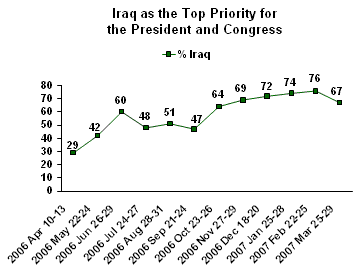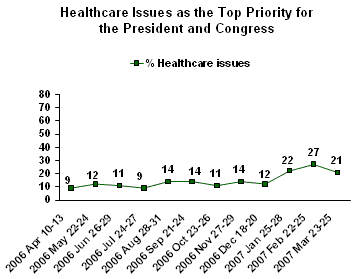GALLUP NEWS SERVICE
PRINCETON, NJ -- The American public continues to say that the war in Iraq should be the top priority for the president and Congress to deal with, according to a new Gallup Panel poll. Roughly two in three Americans (67%) say the Iraq war should be the top government priority right now, making it by far the dominant problem mentioned. Three domestic issues constitute the next most frequently mentioned problems -- healthcare, mentioned by 21% of Americans, the general state of the economy, 15%, and immigration, 12%.
The following table displays the full results of the Mar. 26-29, 2007, poll question that asks Americans to name, without prompting, what should be the "top priority for the president and Congress to deal with at this time."
|
In your view, what one or two issues should be the top priorities for the president and Congress to deal with at this time? |
|
|
2007 Mar 26-29 |
|
|
% |
|
|
Situation in Iraq/war |
67 |
|
Poor healthcare/hospitals; high cost of healthcare |
21 |
|
Economy in general |
15 |
|
Immigration/illegal aliens |
12 |
|
Environment/pollution |
6 |
|
Fuel/oil prices/lack of energy sources/the energy crisis |
6 |
|
Federal budget deficit/federal debt |
4 |
|
Education/poor education/access to education |
4 |
|
National security |
4 |
|
Terrorism |
4 |
|
Social Security |
4 |
|
Poverty/hunger/homelessness |
3 |
|
Poor leadership/corruption/dissatisfaction with government/Congress/ politicians/candidates |
2 |
|
Unemployment/jobs |
2 |
|
Foreign aid/focus overseas |
2 |
|
International issues/problems |
1 |
|
Judicial system/courts/laws |
1 |
|
Medicare |
1 |
|
Taxes |
1 |
|
War/conflict in the Middle East |
1 |
|
Lack of money |
1 |
|
Ethics/moral/religious/family decline; dishonesty; lack of integrity |
* |
|
Unifying the country |
* |
|
Wages |
* |
|
Lack of military defense |
* |
|
Homosexual issues/Gay marriage |
* |
|
Care for the elderly |
* |
|
High cost of living/inflation |
* |
|
Crime/violence |
* |
|
Gap between rich and poor |
* |
|
Welfare |
* |
|
Natural disaster relief/funding |
* |
|
Abortion |
* |
|
Abuse of power |
* |
|
Election year/election reform |
* |
|
|
|
|
Other |
1 |
|
|
|
|
No opinion |
3 |
|
* Less than 0.5% |
|
|
Percentages add to more than 100% due to multiple responses. |
|
While the situation in Iraq continues to dominate the public's list of the top priority for the president and Congress to deal with right now, slightly fewer Americans mention it now than did so in recent months. The latest poll finds 67% of Americans saying Iraq should be the top priority, down slightly from the percentage mentioning it in February and March, but still higher than the 54% average that mentioned Iraq in 2006.
Gallup first asked this "priority" question in April 2006, and at that time, 29% of Americans said Iraq should be the top priority. By June 2006, this percentage increased to 60%, before dropping back in late summer 2006, when roughly half of Americans said Iraq should be the government's top priority. Mentions of Iraq as the top priority have gradually increased each month since then, reaching a high of 76% last month, before declining in the current survey results.

The percentage of Americans who say healthcare should be the top priority for the government has declined slightly since last month, but so far this year mentions of healthcare as the top government priority have averaged 23%, considerably higher than the 12% average in 2006.

Other issues frequently mentioned among the public's list of top priorities for the president and Congress -- the economy, immigration, the environment, and fuel prices -- have shown little to no variation in recent months.
Partisan Priorities
The Iraq war continues to top the list of priorities among both Democrats (including independents who lean toward the Democratic Party) and Republicans (including Republican-leaning independents).
In the latest poll, 79% of Democrats and 55% of Republicans say the war in Iraq should be the top priority for the president and Congress. Democrats have consistently been more likely than Republicans to say that Iraq should be the government's top priority. The current gap between Democrats' and Republicans' mentions of Iraq stands at 24 points, the largest (albeit by only one percentage point) that Gallup has measured since first asking this question.
|
Partisan Trend in Mentions of Iraq as Top Government Priority |
|||
|
Democrats (including "leaners") |
Republicans (including "leaners") |
Gap
|
|
|
% |
% |
|
|
|
2007 Mar |
79 |
55 |
-24 |
|
2007 Feb |
87 |
64 |
-23 |
|
2007 Jan |
78 |
69 |
-9 |
|
2006 Dec |
77 |
66 |
-11 |
|
2006 Nov |
76 |
63 |
-13 |
|
2006 Oct |
72 |
55 |
-17 |
|
2006 Sep |
56 |
37 |
-19 |
|
2006 Aug |
61 |
38 |
-23 |
|
2006 Jul |
54 |
40 |
-14 |
|
2006 Jun |
69 |
49 |
-20 |
|
2006 May |
47 |
37 |
-10 |
|
2006 Apr |
32 |
27 |
-5 |
Beyond Iraq, Republicans and Democrats do differ somewhat in their views of where the president and Congress should be focusing their attention at this time.
Democrats are much more likely than Republicans to say the government should focus its attention on healthcare issues (26% vs. 15%) and the environment (10% vs. 1%). Republicans, on the other hand, more frequently mention immigration (21% vs. 5%) and terrorism or national security (15% vs. 3%). The two party groups are about equally likely to mention the economy and fuel prices as top government priorities.
|
Top Priorities by Party Affiliation |
||
|
Democrats (including "leaners") |
Republicans (including "leaners") |
|
|
2007 Mar 26-29 |
% |
% |
|
Situation in Iraq/war |
79 |
55 |
|
Poor healthcare/hospitals; high cost of healthcare |
26 |
15 |
|
Economy in general |
13 |
16 |
|
Environment/pollution |
10 |
1 |
|
Fuel/oil prices/lack of energy sources/the energy crisis |
8 |
4 |
|
Immigration/illegal aliens |
5 |
21 |
|
National security/terrorism |
3 |
15 |
Survey Methods
Results for this panel study are based on telephone interviews with 1,006 national adults, aged 18 and older, conducted Mar. 26-29, 2007. Respondents were drawn from Gallup's nationally representative household panel, which was originally recruited through random selection methods. For results based on the total sample of national adults, one can say with 95% confidence that the maximum margin of sampling error is ±4 percentage points. In addition to sampling error, question wording and practical difficulties in conducting surveys can introduce error or bias into the findings of public opinion polls.